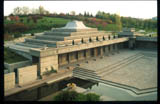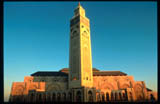|
Historical Background:
The last two decades witnessed the resurgence of a historicist movement
in architecture in the Islamic world that was influenced by contemporary
architectural thinking in the West and fervent searches for cultural identities
in the recently formed nation-states. The manifestations of this movement
range from the romantic approach to historical precedents, pioneered by
the late Egyptian architect Hasan Fathy, to the free, and often arbitrary,
usage of forms detached from their historical and geographic contexts,
as exemplified by the high-quality works of the Egyptian `Abd al-Wahid
al-Wakil and the Iraqi Basil al-Bayati, to the rational, abstracted, and
at times minimalist, projects of architects trained in the modern tradition
who applied logical and deductive methods to their dealing with history,
to the scientific historicism whose proponents classify, analyze, and
re-interpret historical examples to justify their uses.
|
|
|
|
|






